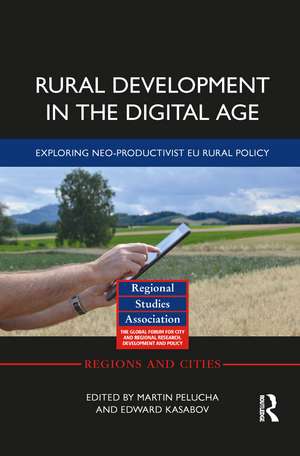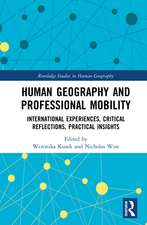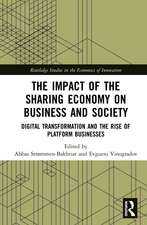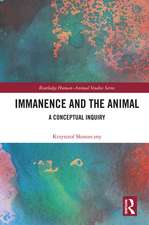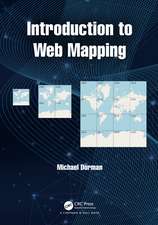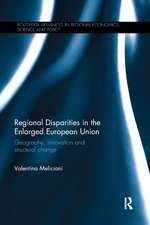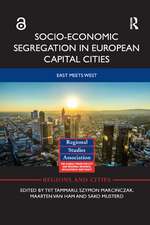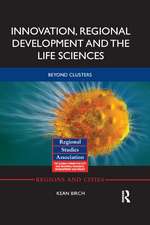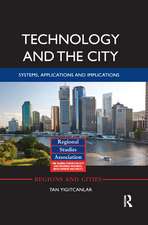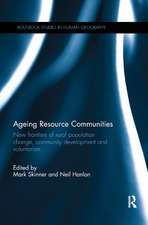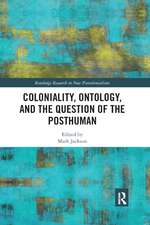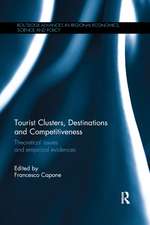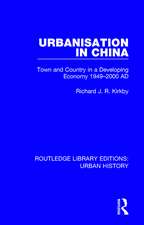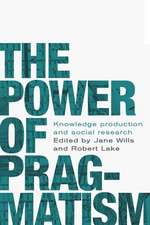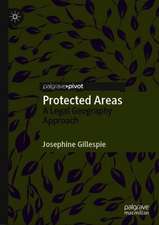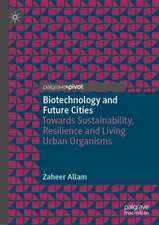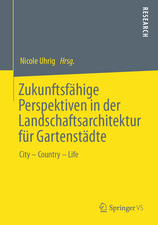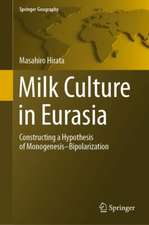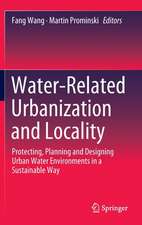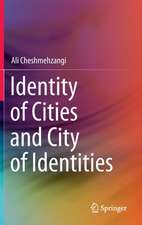Rural Development in the Digital Age: Exploring Neo-Productivist EU Rural Policy: Regions and Cities
Autor Martin Pělucha, Edward Kasaboven Limba Engleză Paperback – 30 iun 2021
The authors examine inconsistencies in the design and implementation of EU rural development policy driven largely by intensifying neo-productivist pressures. The importance and novelty of the book lie in defining and critically examining the territorial impacts of neo-productivism as an ideology, a practice and a set of policy imperatives during the EU’s 2014-2020 programming period. The authors argue that such a paradigm shift in EU rural policy may reduce its effectiveness and ability to meet its goals of balanced territorial development and cohesion.
This book will be of interest to advanced students, researchers and policymakers in rural policy, regional studies, economic geography and EU policy.
| Toate formatele și edițiile | Preț | Express |
|---|---|---|
| Paperback (1) | 386.18 lei 6-8 săpt. | |
| Taylor & Francis – 30 iun 2021 | 386.18 lei 6-8 săpt. | |
| Hardback (1) | 1409.64 lei 6-8 săpt. | |
| Taylor & Francis – 12 noi 2019 | 1409.64 lei 6-8 săpt. |
Din seria Regions and Cities
- 8%
 Preț: 382.90 lei
Preț: 382.90 lei -
 Preț: 310.65 lei
Preț: 310.65 lei -
 Preț: 313.19 lei
Preț: 313.19 lei -
 Preț: 327.83 lei
Preț: 327.83 lei -
 Preț: 326.34 lei
Preț: 326.34 lei -
 Preț: 345.86 lei
Preț: 345.86 lei - 18%
 Preț: 1069.92 lei
Preț: 1069.92 lei - 18%
 Preț: 1293.66 lei
Preț: 1293.66 lei - 18%
 Preț: 1059.14 lei
Preț: 1059.14 lei -
 Preț: 491.26 lei
Preț: 491.26 lei - 15%
 Preț: 701.32 lei
Preț: 701.32 lei - 18%
 Preț: 1119.45 lei
Preț: 1119.45 lei -
 Preț: 421.61 lei
Preț: 421.61 lei - 26%
 Preț: 765.59 lei
Preț: 765.59 lei -
 Preț: 432.22 lei
Preț: 432.22 lei -
 Preț: 285.09 lei
Preț: 285.09 lei - 18%
 Preț: 1173.97 lei
Preț: 1173.97 lei - 26%
 Preț: 763.61 lei
Preț: 763.61 lei - 18%
 Preț: 1169.97 lei
Preț: 1169.97 lei - 15%
 Preț: 461.87 lei
Preț: 461.87 lei - 18%
 Preț: 1341.51 lei
Preț: 1341.51 lei - 18%
 Preț: 1001.90 lei
Preț: 1001.90 lei - 18%
 Preț: 1059.48 lei
Preț: 1059.48 lei - 26%
 Preț: 192.18 lei
Preț: 192.18 lei - 18%
 Preț: 956.83 lei
Preț: 956.83 lei - 15%
 Preț: 428.79 lei
Preț: 428.79 lei - 15%
 Preț: 713.20 lei
Preț: 713.20 lei - 15%
 Preț: 500.55 lei
Preț: 500.55 lei - 18%
 Preț: 1066.09 lei
Preț: 1066.09 lei - 18%
 Preț: 1062.98 lei
Preț: 1062.98 lei - 15%
 Preț: 508.75 lei
Preț: 508.75 lei - 18%
 Preț: 1065.75 lei
Preț: 1065.75 lei - 18%
 Preț: 1172.92 lei
Preț: 1172.92 lei - 18%
 Preț: 1065.06 lei
Preț: 1065.06 lei - 18%
 Preț: 1065.06 lei
Preț: 1065.06 lei - 18%
 Preț: 1064.70 lei
Preț: 1064.70 lei - 18%
 Preț: 709.70 lei
Preț: 709.70 lei -
 Preț: 484.04 lei
Preț: 484.04 lei - 18%
 Preț: 1058.79 lei
Preț: 1058.79 lei - 18%
 Preț: 1171.89 lei
Preț: 1171.89 lei -
 Preț: 239.02 lei
Preț: 239.02 lei - 18%
 Preț: 1061.93 lei
Preț: 1061.93 lei - 18%
 Preț: 1061.57 lei
Preț: 1061.57 lei
Preț: 386.18 lei
Nou
Puncte Express: 579
Preț estimativ în valută:
73.91€ • 76.87$ • 61.94£
73.91€ • 76.87$ • 61.94£
Carte tipărită la comandă
Livrare economică 13-27 martie
Preluare comenzi: 021 569.72.76
Specificații
ISBN-13: 9781032085838
ISBN-10: 1032085835
Pagini: 256
Ilustrații: 21 Illustrations, black and white
Dimensiuni: 156 x 234 x 14 mm
Greutate: 0.37 kg
Ediția:1
Editura: Taylor & Francis
Colecția Routledge
Seria Regions and Cities
Locul publicării:Oxford, United Kingdom
ISBN-10: 1032085835
Pagini: 256
Ilustrații: 21 Illustrations, black and white
Dimensiuni: 156 x 234 x 14 mm
Greutate: 0.37 kg
Ediția:1
Editura: Taylor & Francis
Colecția Routledge
Seria Regions and Cities
Locul publicării:Oxford, United Kingdom
Public țintă
Postgraduate, Professional, and UndergraduateCuprins
Contents Table of contents * Part I: Introduction * Part II: Rural studies in Period 4.0 – theoretical departures * 2. Defining rural areas: a never-ending exercise? * 3. Analysis of Period 4.0 factors in the context of theoretical approaches to rural studies * 4. Paradigms of rural, farm and agricultural diversification * 5. The policy context - Development paradigm of or stabilisation of rural areas? * 6. Partial conclusion * Part III: Territorial drivers of Rural Development 4.0 * 7. Digital rural regions – infrastructure and agenda * 8. Public services in the countryside - context, problems and relevant policy-making * 9. The role of human resources in Period 4.0 – challenges of rural labour markets, education and training, and territorial specifics of EU countries * 10. Territorial urban-rural links - new trends and drivers of regional development * 11. Partial conclusion * Part IV: The Neo-productivist paradigm of Rural Development Policy – challenges ahead * 12. Rural Studies and Rural Development Policy: A Complex, Charged and Contradictory Nexus * 13. Neo-productivism in the EU’s rural development policy-making * 14. Coherence and mismatch of Neo-productivist Rural Policy and Countryside 4.0 * 15. Methodological context of rural development policy assessment * 16. Partial conclusion * Part V: Conclusions * Appendix I: About the Author/Editor *
Notă biografică
Martin Pělucha is Professor of Regional Science at the University of Economics, Prague, Czech Republic.
Prof. Edward Kasabov, Professor in Marketing, Tallinna Tehnikaülikool (Tallinn University of Technology - TalTech).
Prof. Edward Kasabov, Professor in Marketing, Tallinna Tehnikaülikool (Tallinn University of Technology - TalTech).
Descriere
This book explores current theoretical and policy developments in EU rural policy during the 4.0 period. The authors offer an analysis of the contradictory and complex drivers and multiple impacts of Period 4.0 policy within the specific territorial context of its implementation.
